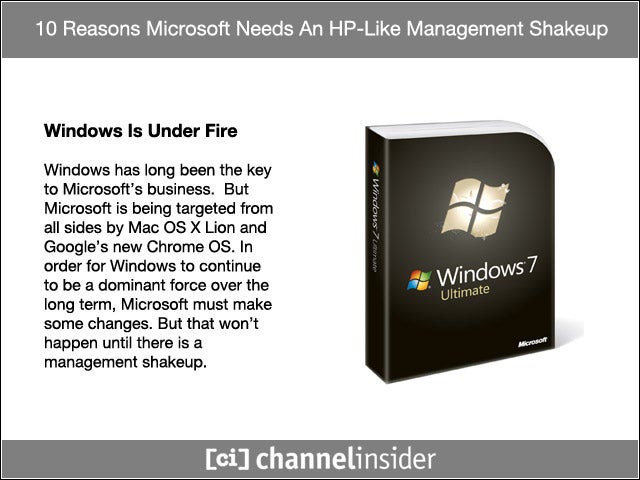 Windows Is Under Fire
Windows Is Under Fire
Windows has long been the key to Microsoft’s business. But Microsoft is being targeted from all sides by Mac OS X Lion and Google’s new Chrome OS. In order for Windows to continue to be a dominant force over the long term, Microsoft must make some changes. But that won’t happen until there is a management shakeup.
 Windows Phone 7 Isn’t Doing Well
Windows Phone 7 Isn’t Doing Well
Windows Phone 7 was supposed to be the operating system that would save Microsoft’s mobile division. But so far, it hasn’t. Some are even wondering if Windows Phone 7 will die before its time. In order for things to drastically change in Microsoft’s mobile division, management will need to change.
 Google Is Threatening
Google Is Threatening
Over the last several years Microsoft’s executives have been made to look foolish by Google’s team of executives. Only a a major shakeup in leadership with people who know how to handle a more agile, forward-thinking competitor can save the company’s reputation.
 Ballmer Isn’t Cutting It
Ballmer Isn’t Cutting It
Microsoft CEO Steve Ballmer just isn’t delivering the right value to Microsoft’s shareholders. He made poor decisions with Vista and Windows Phone. He doesn’t seem to understand the value of the Web to his company’s future operation, and he still relies too heavily upon Office. If anyone needs to be ousted at Microsoft, it’s Ballmer.
 It Subscribes to Old Ideas
It Subscribes to Old Ideas
Microsoft’s strategies over the years have shown just how out of date the company really is. It allowed Apple and Google to capitalize on the touch-screen market, it failed to see the importance of app stores in desktop operating systems, and the cloud is still up for grabs. Meanwhile, Microsoft has subscribed to old ideas. If that’s not a sign of management troubles, what is?
 Tablets Are Still An Issue
Tablets Are Still An Issue
Tablets continue to be a major issue for Microsoft. Though the software giant has been saying for years that it will be a presence in the tablet market, it isn’t. It may miss out on that market entirely. Tablets are the future, and if Microsoft continues to bungle the opportunity, its management will need to be replaced.
 Vendor Partners Are Looking Elsewhere
Vendor Partners Are Looking Elsewhere
For years, one of Microsoft’s greatest strengths was its relationship with hardware partners. Companies like HP, Dell, and others have always stood by Microsoft. But now Dell is doubling down on Android in the mobile space, and HP has a mobile operating system of its own. The days of Windows meaning everything to hardware manufacturers seem to be slipping away.
 It Has Always Been Slow to React
It Has Always Been Slow to React
Microsoft has always been slow to react to changing times, but the company looks even slower than ever before. For instance, in the mobile market Apple and Google easily outpaced Microsoft in new smartphone operating systems and touch screens. The days of Microsoft agility are long gone, and perhaps some new faces at the top could change that.
 Apple Is A Threat Too
Apple Is A Threat Too
Though people often point to Google as Microsoft’s main threat, it’s important to keep in mind that Apple’s growth is becoming an issue for the software giant. As the world’s largest tech firm, Apple has more leverage than ever before. And its position in the mobile market could prove troublesome for Microsoft going forward. Microsoft management’s current response to Apple’s threat just isn’t cutting it. They have to go.
 The Cloud, The Cloud, The Cloud
The Cloud, The Cloud, The Cloud
Though Microsoft has been doing a passable job capitalizing on the growth of the cloud, the company hasn’t done nearly enough. Google beat Microsoft to the cloud-based operating system market, and the software giant has yet to deliver a solution that gives it the upper hand over its many competitors. At what point will Microsoft focus more of its efforts (and cash) on the cloud to ensure it’s a dominant player?

